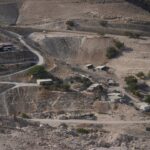
Israel has given final approval for a controversial settlement project in the occupied West Bank that experts say would damage plans for any future territorially contiguous Palestinian state in the territory.
Israeli Finance Minister Bezalel Smotrich, who announced the plan on August 14, hailed the decision as “historic” and framed the approval as a rebuke to Western countries that announced their plans to recognise a Palestinian state in recent weeks.
list 1 of 4
Smotrich announces Israeli plan to split occupied West Bank in half
list 2 of 4
The day Israeli settlers lynched two young men in the West Bank
list 3 of 4
How the world is reacting to Israel’s E1 settlement plan in the West Bank
list 4 of 4
Children tear gassed at football practice in occupied West Bank
end of list
“The Palestinian state is being erased from the table not with slogans but with actions,” Smotrich, a settler himself, said on Wednesday.
“Every settlement, every neighbourhood, every housing unit is another nail in the coffin of this dangerous idea.”
Settlement development in E1, an open tract of Palestinian land east of Jerusalem, has been under consideration for more than two decades, but was frozen due to United States pressure during previous administrations. Israel’s settlement-building in occupied territory is considered illegal under international law.
Infrastructure work in E1 could begin in the next few months and construction of homes could start in about a year. The plan includes about 3,500 apartments that would be situated next to the existing settlement of Maale Adumim.
“I am pleased to announce that just a short while ago, the civil administration approved the planning for the construction of the E1 neighbourhood,” the mayor of Maale Adumim, Guy Yifrach, said in a statement on Wednesday.
The location of E1 is significant because it is one of the last geographical links between the major West Bank cities of Ramallah, in the north, and Bethlehem, in the south.
Advertisement
The two cities are 22 kilometres (14 miles) apart, but Palestinians travelling between them must take a wide detour and pass through multiple Israeli checkpoints. The hope among advocates for a Palestinian state was that the region would serve as a direct link between the cities.
“The settlement in E1 has no purpose other than to sabotage a political solution,” said Peace Now, an organisation that tracks settlement expansion in the West Bank.
“While the consensus among our friends in the world is to strive for peace and a two-state solution, a government that long ago lost the people’s trust is undermining the national interest, and we are all paying the price.”
Last week, the United Nations urged Israel to reverse its decision to start work on the settlement.
“It would put an end to prospects of a two-state solution,” UN spokesperson Stephane Dujarric told reporters.
“Settlements go against international law … [and] further entrench the occupation.”
Breaking the Silence, an Israeli rights group established by former Israeli soldiers, had also last week called the plan a land grab which “will not only further fragment the Palestinian territory, but will further entrench apartheid”.
Israeli Prime Minister Benjamin Netanyahu rejects the idea of a Palestinian state alongside Israel and has promised to maintain open-ended control over the occupied West Bank, annexed East Jerusalem, and war-ravaged Gaza – territories Israel seized in 1967.
Israel’s expansion of settlements has occurred alongside marked increases in attacks by settlers on Palestinians, evictions from Palestinian towns, Israeli military operations and checkpoints that choke freedom of movement.
More than 700,000 Israeli settlers now live on Palestinian land in the occupied West Bank and East Jerusalem.
British Caribbean News


